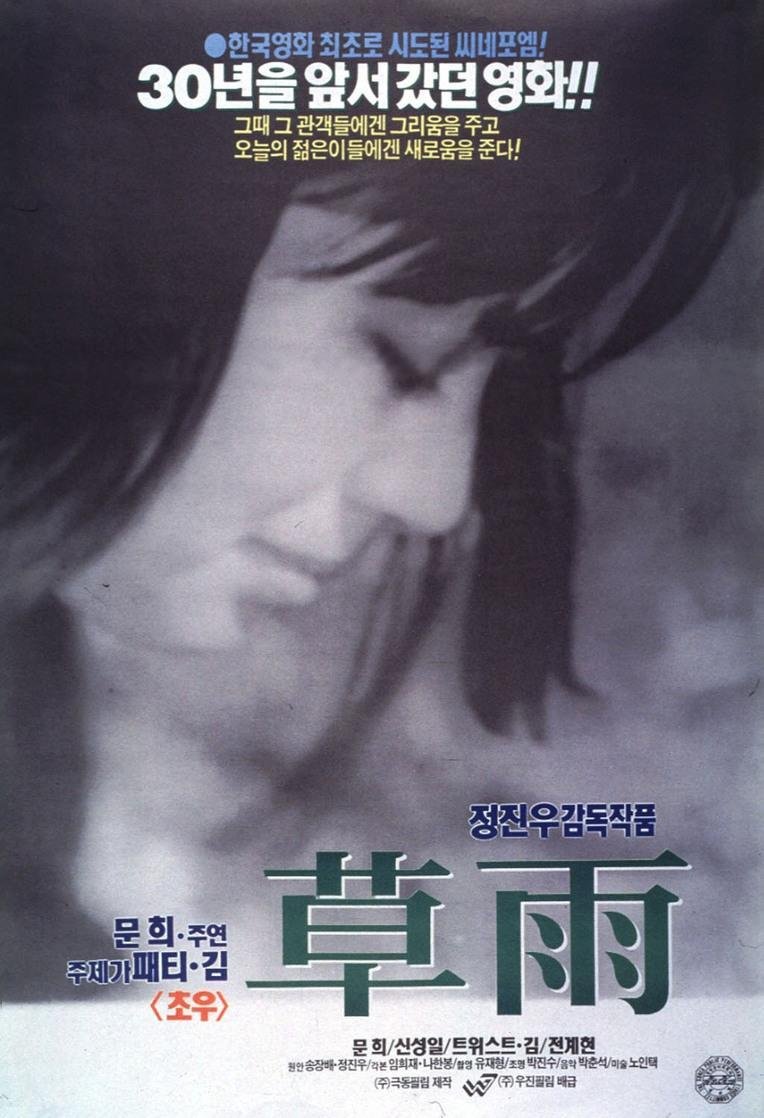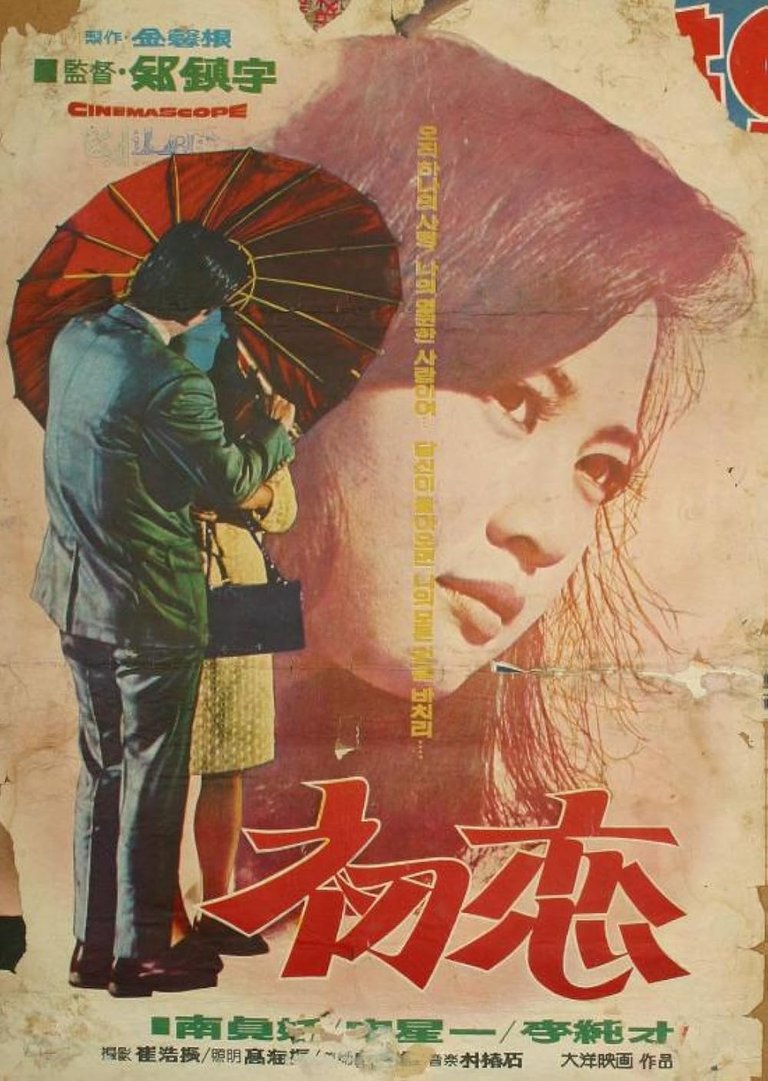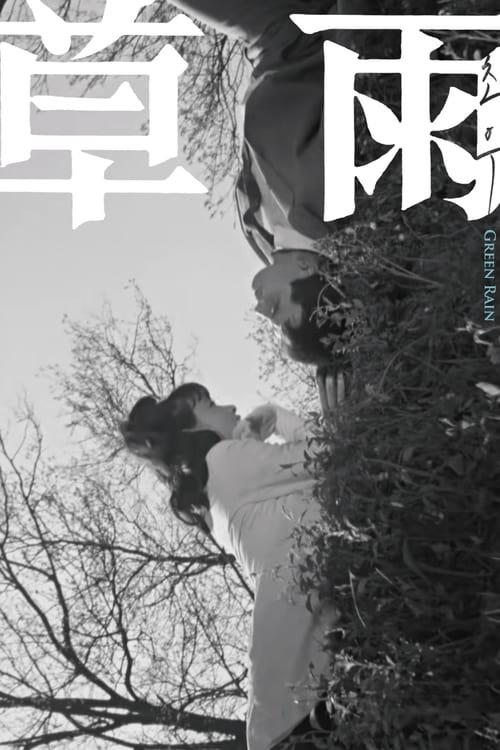An Early Rain (1966): duel of deception | duelo de engaños

When talking about Asian cinema, good Japanese cinema and good South Korean cinema are always mentioned. However, I had the impression that I had always heard the film industry of this second country mentioned as something emerging and new, whose oldest reference seemed to be Kim Ki-duk with those brilliant films from the early 2000s. Japan had Kurozawa, Ozu, Mizoguchi, Kobayashi, but did South Korea have any famous film directors in the previous decades of the 20th century?
Al hablar de cine asiático se menciona siempre el buen cine japonés y el buen cine de Corea del Sur. Sin embargo, tenía la impresión de que siempre había oído mencionar la industria cinematográfica de este segundo país como algo emergente y nuevo, cuyo referente más antiguo parecía ser Kim Ki-duk con esos brillantes films de principios de la década del dos mil. Japón tuvo a Kurozawa, Ozu, Mizoguchi, Kobayashi, pero ¿tuvo Corea del Sur algún director de cine célebre en las décadas previas del siglo XX?
Yes, it had several and one of them was Jeong Jin-woo, who in 1963 became the youngest film director in the country when he released The Only Son when he was barely 23 years old. Three years later he released what would be one of the most famous teenage dramas of the sixties and one of his most remembered films: An Early Rain. With a script by Han-bong Na, music by Park Chun-seok and black and white photography by Yu Jae-hyeong, the film tells the story of Chul-soo, a young man who works in a mechanical workshop. On a rainy day, he meets a beautiful young woman wearing a very elegant coat to whom he offers to drive her home so she doesn't get wet. Upon arriving at the place indicated by the girl, Chul-soo recognizes the house of an important diplomat, an ambassador on duty abroad, and knowing that the man has a daughter, he immediately deduces that the girl he has just taken is none other than the ambassador's daughter. Using his gallantry and wanting to see the woman in the coat again, Chul-soo asks her to meet again, to which she responds by making an appointment for the next afternoon when it rains. These types of dates without a schedule or date have always seemed very romantic to me and the mischief of the girl that comes into play with the flirtatiousness of the young man make a good mix during the first part of the film.
Sí, tuvo varios y uno de ellos fue Jeong Jin-woo, quien en 1963 se convirtió en el director de cine más joven del país al estrenar The Only Son cuando apenas tenía 23 años. Tres años más tarde dio a conocer el que sería uno de los dramas adolescentes más famosos de la década de los sesenta y una de sus películas más recordadas: An Early Rain. Con guión de Han-bong Na, música de Park Chun-seok y fotografía a blanco y negro de Yu Jae-hyeong, la cinta cuenta la historia de Chul-soo, un joven que trabaja en un taller mecánico y en un día de lluvia se encuentra con una hermosa joven que luce un abrigo muy elegante a quien le ofrece conducirla a casa para que no se moje. Al llegar al lugar indicado por la chica, Chul-soo reconoce la casa de un importante diplomático, un embajador que cumple funciones en el extranjero, y sabiendo que el hombre tiene una hija, inmediatamente deduce que la chica a la que acaba de llevar es nada más y nada menos que la hija del embajador. Haciendo uso de su galantería y queriendo volver a ver a la mujer del abrigo, Chul-soo le pide que vuelvan a encontrarse, a lo que ella responde citándolo para la próxima tarde en que llueva. Este tipo de citas sin horario ni fecha siempre me han parecido muy románticas y la picardía de la chica que entra en juego con la coquetería del joven hacen una buena mezcla durante la primera parte de la película.

But what Chul-soo doesn't know (and we do), is that the girl, named Yeong-hee, is not actually the ambassador's daughter but a maid of the house. The coat was a gift from her boss and when Chul-soo mistook her for the diplomat's daughter, Yeong-hee decided to humor him because she liked the boy's character. Plus, she met him on a rainy afternoon and she loves the rain. For that reason, at the end of that first meeting, she cited him the way she did.
Pero lo que Chul-soo no sabe (y nosotros sí), es que la chica, llamada Yeong-hee, no es en realidad la hija del embajador sino una criada de la casa. El abrigo fue un regalo de su patrona y cuando Chul-soo la confundió con la hija del diplomático, Yeong-hee decidió seguirle la corriente porque le agradó el carácter del chico. Además, lo conoció en una tarde lluviosa y ella ama la lluvia. Por esa razón, al final de ese primer encuentro, lo citó de la forma en que lo hizo.
Now, don't think that Yeong-hee is the bad one of the movie for having lied to Chul-soo. First of all, who can blame her? Being young and poor, eager to know the world and love, that mistake represented for her the possibility of being someone else and, in her opinion, someone better, someone superior. Wealthy people are not happier, but unfortunately in a society like ours they do receive better treatment. Would Chul-soo have asked her out again if he had known she was a simple maid? The doubts remain. The other reason why we shouldn't put all the blame on the girl is because Chul-soo also decides to lie to her. He cannot tell her the truth and confess that he is a simple mechanic because she is the daughter of an important politician, so he invents a story of wealth and business that accompanies the use of the automobiles that arrive at the workshop where he works and with the presence of a driver who is nothing more than a co-worker. A spiral of lies and pretenses from one side and the other then begins. Chul-soo goes into debt so he can ask Yeong-hee out several times; and she, also wanting to support her wealthy facade, begins to work - in addition to being a maid in the ambassador's house - as a laundress in a place near her residence to obtain extra money and be able to share this money with Chul-soo. Although both are sacrificing themselves to please the other, that search to impress each other is based on lies and as the saying goes, "lies have short legs".
Ahora bien, que no se piense que Yeong-hee es la mala de la película por haberle mentido a Chul-soo. Primero que nada, ¿quién puede culparla? Siendo joven y pobre, deseosa de conocer el mundo y el amor, aquel equívoco representaba para ella la posibilidad de ser alguien más y, en su opinión, alguien mejor, alguien superior. La gente adinerada no es más feliz, pero desafortunadamente en una sociedad como la nuestra sí reciben un mejor trato, ¿la habría invitado a salir de nuevo Chul-soo si hubiera sabido que era una simple criada? Quedan las dudas. La otra razón por la que no hay que echarle toda la culpa a la chica es porque Chul-soo también decide engañarla. No puede decirle le verdad y confesar que es un simple mecánico porque se trata de la hija de un político importante, entonces se inventa una historia de riquezas y negocios que acompaña con el uso de los automóviles que llegan al taller en el cual trabaja y con la presencia de un chofer que no es más que un compañero de trabajo. Comienza entonces una espiral de mentiras y fingimientos de un lado y de otro. Chul-soo se endeuda para poder invitar a salir varias veces a Yeong-hee; y ella, queriendo también respaldar su fachada de adinerada comienza a trabajar - además de como criada en la casa del embajador - como lavandera en un lugar cerca de su residencia para obtener dinero extra y poder compartir este dinero con Chul-soo. Si bien ambos se están sacrificando por complacer al otro, esa búsqueda para impresionarse está basada en mentiras y como dice el dicho, "las mentiras tienen patas cortas".
.png)
When they both discover the truth, there are complaints from one side and the other, but there seems to be an intention on both sides to make everything work. Stripped of their impostures until they show themselves as the mechanic and maid that they are, Yeong-hee and Chul-soo will search for their happily ever after, will they achieve it? Will truth and love triumph? Or will guilt and reparation for having lied prevail?
Cuando ambos descubren la verdad, hay reclamos de un lado y del otro, pero parece haber una intención por parte de ambos de hacer que todo funcione. Desvestidos de sus imposturas hasta mostrarse como el mecánico y la criada que son, Yeong-hee y Chul-soo buscarán su felices para siempre, ¿lo conseguirán? ¿triunfarán la verdad y el amor? ¿o se impondrán la culpa y el desagravio de haberse mentido?
I must say that the first part of the movie has a more romantic and fun tone. There are several scenes in the workshop that are comedy, there are bars, bands playing rock, and walks in the park, there is the rain and an emerging romance. But towards the last half hour, once the truth is discovered, we see a more dramatic film, with more arguments and some verbal and physical violence. It's true that the black and white photography and the release date lead us to relate An Early Rain with some Hollywood classics, but those are not the only similarities. The way of making some jokes, certain shots in the scenes, are very much in the style of cinema from the 40s or 50s in the golden era of Hollywood. And for those who don't like black and white cinema, the same director released a color remake in 1975. I didn't know, or rather, I hadn't thought about the possibility that South Korea had such an early cinematic history, but it's logical that it exists because if not, where would the great later directors have come from? What great national references would have inspired them? If any of you enjoy Korean cinema, romance movies, and black and white classics, you can definitely enjoy An Early Rain, have any of you seen this movie? I read you in the comments.
Debo decir que la primera parte de la película tiene un tono más romántico y divertido. Hay varias escenas en el taller que son de comedia, hay bares, bandas que tocan rock, y paseos por el parque, están la lluvia y un romance emergente. Pero hacia la última media hora, una vez que la verdad es descubierta, vemos una película más dramática, con más discusiones y un poco de violencia verbal y física. Es cierto que la fotografía en blanco y negro y la fecha de estreno nos llevan a relacionar An Early Rain con algunos clásicos de Hollywood, pero no sólo son esos los parecidos. La forma de hacer algunas bromas, ciertas tomas en las escenas, son muy al estilo del cine de los años 40 o 50 en la era dorada de Hollywood. Y para quienes no les guste el cine en blanco y negro, el mismo director estrenó un remake a color en 1975. Yo no sabía, o mejor dicho, no había pensado en la posibilidad de que Corea del Sur tuviera una historia cinematográfica tan temprana, pero es lógico que exista porque si no, ¿de dónde habrían salido los grandes directores posteriores? ¿qué grandes referentes nacionales los habrían inspirado? Si alguien disfruta el cine coreano, las películas románticas y los clásicos en blanco y negro, sin duda puede disfrutar An Early Rain, ¿alguno de ustedes ha visto esta película? Los leo en los comentarios.
Reseñado por @cristiancaicedo
Other posts that may interest you | Otros posts que pueden interesarte:
 |
|---|




Buena reseña amigo. El cine Coreano tiene mucho que ofrecer. Y este es un filme bastante interesante por lo que leo. Me la buscaré para verla este domingo 😁
Muy apropiada tu presentación del cine surcoreano, a través de la reseña de ese emblemático filme de uno de sus principales cineastas iniciadores. Saludos, @cristiancaicedo.
Muchas gracias por la valoración y el comentario.
Me ha llamado la atención cómo describes la atmósfera y el tono de la película, con esa mezcla de romanticismo, comedia y drama a lo largo de la trama. No es mi tipo de película, pero se ve muy prometedora.